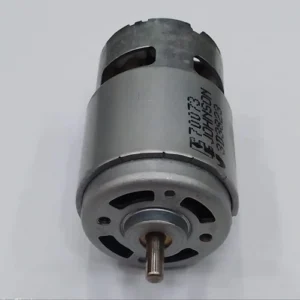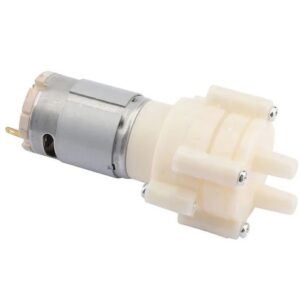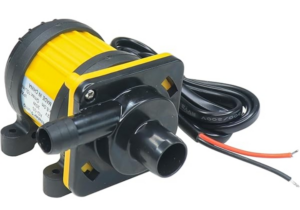Electrical Equipment and Supplies
- “Run+ 30 KVA Diesel Silent Generator” already exists in your wishlist
-
12V Johnson 775 High Speed Dc Motor
Type Single Phase Electric MotorVoltage 12VMaterial Aluminium₹225.00 -
12V DC Pump White 5mm High Pressure R385
This R385 DC 6-12V MINI Aquarium Water Pump is the perfect choice for any project that requires water to be moved from one place to another. When pumping a liquid the pump runs very quietly. The pump is also capable of pumping air
The R385 requires between 6 – 12 VDC and between 0.5 – 0.7A and will deliver its maximum operating values when power is at the upper end of these ranges. The pump can handle pumping heated liquids up to a temperature of 80 degrees Celsius and when suitably powered can suck water through the tube from up to 2m and pump water vertically for up to 3m.
This Non-submersible pump can be used to water your plants, make a fountain or waterfall, and even change your fish tank water. It works quietly with the sound level under 30db. The pump has a filter inside as well as a suction cup which can help stick it to smooth surfaces tightly.
₹189.00₹199.0012V DC Pump White 5mm High Pressure R385
₹189.00₹199.00 -
12V 20-watt DC Submersible Under Water Pump
- Working voltage: DC 12V
- Power rating: 20W
- Max water height: 6.0m
- Max Flow: 15 L/min
- Diameter of inlet – 16 mm
- Diameter of outlet – 11 mm
₹599.00₹999.0012V 20-watt DC Submersible Under Water Pump
₹599.00₹999.00 -
120 W Polycrystalline Solar Panel
Type of Solar Panel Poly CrystallineOperating(Nominal) Voltage 12VNumber of cells 36 cells₹36.00/ Watt120 W Polycrystalline Solar Panel
₹36.00/ Watt
Electrical Equipment and Supplies: A Comprehensive Guide
Introduction
Electrical equipment and supplies play a crucial role in powering homes, businesses, and industries. From wiring and circuit breakers to transformers and lighting solutions, these components ensure a safe and efficient flow of electricity.
This guide explores different types of electrical equipment, their applications, benefits, and essential FAQs to help you make informed purchasing decisions.
Types of Electrical Equipment and Supplies
1. Power Distribution Equipment
Power distribution equipment ensures the safe and efficient transfer of electrical energy from the source to various appliances and devices.
- Circuit Breakers – Protect electrical circuits from damage caused by overcurrent or short circuits.
- Switchboards & Panels – Used for controlling the distribution of electricity in buildings.
- Transformers – Convert voltage levels to meet the requirements of different electrical systems.
- Fuses & Relays – Essential for protecting electrical systems from overloads.
2. Wiring and Cables
Wiring and cables form the backbone of any electrical system, transmitting power safely and efficiently.
- Electrical Wires – Used for conducting electricity in residential, commercial, and industrial applications.
- Coaxial Cables – Commonly used for data and TV signal transmission.
- Fiber Optic Cables – Ideal for high-speed data transmission.
- Underground Cables – Designed for buried electrical distribution systems.
3. Lighting Solutions
Lighting is essential for safety, productivity, and aesthetics in any space.
- LED Lights – Energy-efficient and long-lasting lighting solutions for homes and businesses.
- Fluorescent Tubes – Commonly used for commercial and industrial spaces.
- Smart Lighting Systems – Control brightness and color via mobile apps or voice commands.
- Outdoor & Industrial Lighting – Designed for harsh weather conditions and high durability.
4. Electrical Safety Equipment
Electrical safety equipment ensures the protection of individuals and electrical systems from hazards.
- Surge Protectors – Prevent damage from voltage spikes.
- Grounding Equipment – Ensures safe discharge of electrical energy.
- Personal Protective Equipment (PPE) – Includes insulated gloves, safety boots, and protective eyewear.
- Smoke and Carbon Monoxide Detectors – Essential for safety in homes and businesses.
5. Power Storage and Backup Systems
These systems provide power during outages and ensure uninterrupted electricity supply.
- Batteries – Store electrical energy for backup power.
- Generators – Provide power during grid failures.
- Uninterruptible Power Supplies (UPS) – Prevent data loss and system shutdowns during power interruptions.
- Solar Power Storage Systems – Store solar energy for use at night or during power outages.
Benefits of Using High-Quality Electrical Equipment
- Improved Safety – Reduces risks of electrical fires, short circuits, and power failures.
- Energy Efficiency – Lowers electricity consumption and utility bills.
- Longer Lifespan – Durable components last longer and require less frequent replacements.
- Enhanced Performance – Ensures reliable and consistent power supply.
- Sustainability – Energy-efficient solutions reduce environmental impact.
Installation and Maintenance Tips
Installation Guidelines
- Always follow the manufacturer’s instructions for installing electrical components.
- Hire a licensed electrician to ensure compliance with safety standards.
- Use proper wiring and cable management to avoid clutter and reduce fire hazards.
- Ensure electrical panels and outlets are easily accessible for future maintenance.
Maintenance Tips
- Regularly inspect wiring and components for signs of wear and tear.
- Test circuit breakers and safety devices to ensure functionality.
- Clean electrical equipment to prevent dust accumulation that could cause overheating.
- Replace outdated components to maintain efficiency and safety.
Frequently Asked Questions (FAQs)
1. What is the difference between a circuit breaker and a fuse?
A circuit breaker is a reusable switch that automatically turns off during an overload, while a fuse is a single-use device that melts when exposed to excessive current.
2. How do I choose the right wire size for my electrical needs?
Wire size depends on the current load, voltage, and distance. Consulting a professional or using an electrical wire gauge chart is recommended.
3. Are LED lights better than traditional bulbs?
Yes, LED lights consume less power, last longer, and generate less heat compared to traditional incandescent bulbs.
4. What is the purpose of grounding electrical systems?
Grounding prevents electrical shocks and reduces the risk of electrical fires by directing excess current safely into the ground.
5. Can I install a generator at home without professional help?
It is recommended to hire a certified electrician for generator installation to ensure proper wiring and compliance with safety regulations.
6. How often should I replace electrical outlets and switches?
Electrical outlets and switches should be replaced every 10-15 years or earlier if they show signs of damage or wear.
7. What are surge protectors, and do I need one?
Surge protectors prevent voltage spikes from damaging electronic devices. They are essential for sensitive electronics like computers and TVs.
8. Can I use solar power for my entire home?
Yes, with the right solar panels, inverters, and battery storage, you can power an entire home using solar energy.
9. What is the lifespan of electrical cables?
Electrical cables typically last 20-40 years, depending on the material, environmental conditions, and usage.
10. How can I reduce my electricity bills?
- Use energy-efficient appliances and LED lighting.
- Unplug devices when not in use.
- Install smart thermostats and power-saving solutions.
- Consider using solar energy to supplement grid power.
Conclusion
Choosing high-quality electrical equipment and supplies ensures safety, efficiency, and long-term reliability. Whether you’re upgrading your home’s wiring, installing a backup power system, or looking for energy-efficient lighting, investing in the right electrical components is essential.
Explore a wide range of electrical equipment and supplies today to power your home and business efficiently!




